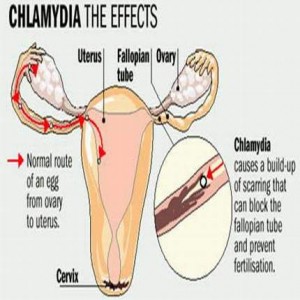What's in this article?
What is a Chlamydia Infection?
 Chlamydia is a sexually transmitted disease that should be treated quickly in order to avoid complications. It usually caused by bacteria that are spread through sexual contact. A person with chlamydia often don’t have any signs of symptoms. Therefore, we you think you may have been exposed to the disease, you should go to the doctor and be examine right away.
Chlamydia is a sexually transmitted disease that should be treated quickly in order to avoid complications. It usually caused by bacteria that are spread through sexual contact. A person with chlamydia often don’t have any signs of symptoms. Therefore, we you think you may have been exposed to the disease, you should go to the doctor and be examine right away.
Risk and Causes of Chlamydia Infection
People of all ages and both sexes can get chlamydia. But having sexual relations with several partners without using protection can greatly increase your chance of getting the disease.
In addition, men and women under the age of 25 tend to have a higher risk of being infected with chlamydia. Women is also have a higher risk. Pregnant women can pass the bacteria to their babies when they are born. If you are pregnant and with a chance you have chlamydia, you should volunteer to be tested.
Recognizing the Signs of Chlamydia
Many patients do not notice the symptoms of chlamydia. The symptoms usually appear one to three weeks after you have been infected. The most common symptoms include:
♦ burning feeling during urination
♦ discharge from the penis or vagina
♦ pain in the lower abdomen
♦ painful sexual intercourse in women
♦ pain in the testicles in men
In other few women, chlamydia infection can be spread to the Fallopian tubes, which may cause fever, nausea, and abnormal bleeding between periods.
Other patients can get chlamydia infection in the rectum, in which case the main symptoms are often discharge, pain, and bleeding from this area.
If you engage oral sex with somebody who has chlamydia, you may get this infection in your throat, which can lead to painful swallowing, a cough, and a fever.
Diagnosing Chlamydia
Your doctor will ask some questions about your sexual partner activities, like if you have had multiple partners recently. You will also likely be asked about your symptoms. Your doctor may ask why you believe you might have this disease.
Your doctor may run tests to find out if the bacteria that cause chlamydia is in your body. Urine test will done. You may also have your cervix swabbed if you are female, while your in urethra, in where urine flows from. May be swabbed if you are male. To check if there is a chance the chlamydia is in your rectum or throat, these particular areas may be swabbed.
Treating Chlamydia
Since bacteria cause chlamydia, the disease can often be treated with antibiotics. Antibiotic usually prescribed in a single dose, the doxycycline will be taken twice per day for about one week.
There are other antibiotics that your doctor may prescribe. The antibiotic you are given you, need to be follow the dosage instructions carefully to make sure the infection clears up fully. It usually takes two weeks at most, in which time you will need to refrain from sexual contact.
Long-Term Complications and Outlook
If you go see the doctor soon after you suspect you’ve contracted chlamydia infection, you will clear up the infection with no lasting problems. But if you wait too long to treat it, you’ll end up a serious medical issues.
Female Complications
Some women develop pelvic inflammatory disease (PID), an infection that can damage the uterus, ovaries and cervix. It is a painful disease that often requires hospital treatment.
Women can also become infertile if chlamydia is left untreated, the Fallopian tubes may become scarred. Pregnant woman carries chlamydia can pass the bacteria to their babies during birth, this can lead to eye infections and pneumonia in newborns.
Male Complications
Men can also experience complications when chlamydia is left untreated. The epididymis, the tube that holds the testicles in place, may be inflamed, that causing pain. The infection can spread to the prostate gland, that lead to a fever, painful intercourse and pain in the lower back.
These are just some of the most common complications of untreated chlamydia, that is why it is very important to get medical attention. Some people who are treated quickly have no long-term medical problems.
Prevention
One of the most effective ways of avoiding chlamydia infection is by limiting the amount of new sexual partners you have. The more person that you have sexual intercourse with,there is greater chances of being exposed to the disease. During each sexual encounter, condom is needed for prevention purposes.





